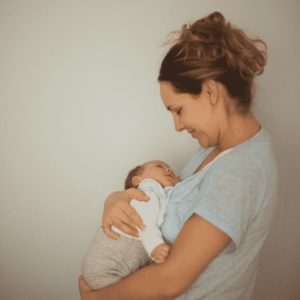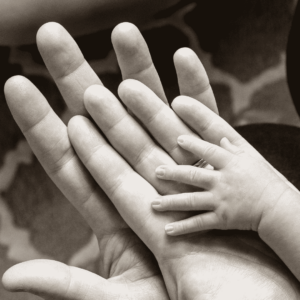Becoming a parent is a process!

The postnatal period is a stage of life, transition and turbulence in the life of a man, a woman and a couple welcoming a child into their lives. Traditionally, most couples gather information about pregnancy and prepare for birth. In the same way, medical services related to pregnancy follow-up are also well established, but very soon after the birth, it’s often a time of emptiness and isolation. Few parents are aware of what will happen afterwards, when they return home, especially primiparous parents (parents for the first time).
The months following childbirth are often referred to as the “4th trimester”. This period is part of a logical continuum of becoming a parent: after pregnancy and childbirth, comes parenthood. It’s the start of life with a baby, when we learn to live and function together.
But do we really think that as soon as we arrive home with a cute baby, that both mother and father will feel comfortable in their new roles and automatically blossom? Well, the truth is simply NO!
Definition of matrescence
Matrescence is a theoretical concept that combines the words motherhood and adolescence to explain how becoming a mother can bring with it so much emotional turmoil, tumult and weird feelings akin to the transition an adolescent may experience in his or her search for identity as he or she moves into adulthood.
It’s an intense period, when the emotional charge reaches new heights.
 The simple definition of the concept of matrescence is: “A stage, a developmental phase where a woman also becomes a mother.”
The simple definition of the concept of matrescence is: “A stage, a developmental phase where a woman also becomes a mother.”
“It’s the birth of a mother”
“When a baby is born, a mother is born too”
The terminology matrescence was coined in 1973 by an American anthropologist by the name of Dana Raphael, then put back on the map in 2017 by American psychiatrist Alexandra Sacks, who brought this concept out of the dustbin to explain to the women who consulted her that they were neither sick, nor depressed, nor crazy, but in fact undergoing normal adaptation through a change of role.
Life stage
 We all know that childbirth brings with it a series of changes for the new mother, physically, emotionally and in terms of her image as a woman. Her identity as a mother has to be defined, constructed and built up, while at the same time dealing with a body she no longer recognizes, unexplained mood swings and unprecedented hormonal changes.
We all know that childbirth brings with it a series of changes for the new mother, physically, emotionally and in terms of her image as a woman. Her identity as a mother has to be defined, constructed and built up, while at the same time dealing with a body she no longer recognizes, unexplained mood swings and unprecedented hormonal changes.
Having a word, a name that describes this phase of development, just as we do for adolescence, can certainly help, relieve and ease the guilt of some women who misunderstand what they’re going through at this time. Having a name that explains things also shows that they’re not alone in going through this period, sometimes in turmoil. Feeling disorganized at times, overwhelmed by events or experiencing contradictory, unexplained, unexpected feelings, can be NORMAL!
Matrescence isn’t a negative thing in itself; it is experiencing both the positive and the negative simultaneously. That’s why 10 to 20% of new mothers will feel a bit like they’re sitting between two chairs, feeling weird without being depressed, but not 100% fulfilled with their baby in their new role either. Feeling immense happiness and extreme loneliness at the same time, feeling so much love and so much anguish in front of this little human. What a dichotomy of emotions!
 The paradox of attraction versus repulsion (or rejection) can give rise to guilt in the mother. Wanting to take care of her baby, feeling attracted, wanting to take care of him due to the hormones that help this process, and at the same time, wanting in her mind to go back to her old life and meet her needs spontaneously, if only to take a quiet bath, see her friends, go to her job that she loves and see her colleagues. This ambivalence is NORMAL!
The paradox of attraction versus repulsion (or rejection) can give rise to guilt in the mother. Wanting to take care of her baby, feeling attracted, wanting to take care of him due to the hormones that help this process, and at the same time, wanting in her mind to go back to her old life and meet her needs spontaneously, if only to take a quiet bath, see her friends, go to her job that she loves and see her colleagues. This ambivalence is NORMAL!
Even though many studies provide information on the psychological state of adolescence, as women discover their own identity, very little is written on the emotional state of transformation experienced by a woman becoming a mother. The way in which a woman experiences her transition to motherhood is individual, depending on who she is, her temperament, her education, her environment, her history, her lifestyle, but what is certain for all women is that there will be ups and downs, with necessary adjustments and sometimes, collateral effects that are more difficult to manage at times. So there’s no pre-determined length of time, and each woman learns at her own pace.
Neurobiological changes during matrescence
We all know that the arrival of a baby for a couple is an intense period, fraught with high levels of stress and anxiety. Adapting to the new status of parents can sometimes be brutal for some people who never imagined they would have to face so many unknowns, uncertainties, responsibilities and demands.
 In terms of neurobiology, it’s scientifically proven that a pregnant woman’s brain changes during pregnancy and changes again after birth. There’s a deeper connection with our emotions, which helps us to become more receptive to our baby’s needs, to identify and respond to hunger, pain, comfort, sleep and so on. What’s more, studies show that the brain also changes in fathers, adoptive parents and second mothers. In other words, the psychological preparation that goes into welcoming a baby brings out an emotional intensity in those intimately involved with the child – parents in general, not just the woman carrying and giving birth to the baby.
In terms of neurobiology, it’s scientifically proven that a pregnant woman’s brain changes during pregnancy and changes again after birth. There’s a deeper connection with our emotions, which helps us to become more receptive to our baby’s needs, to identify and respond to hunger, pain, comfort, sleep and so on. What’s more, studies show that the brain also changes in fathers, adoptive parents and second mothers. In other words, the psychological preparation that goes into welcoming a baby brings out an emotional intensity in those intimately involved with the child – parents in general, not just the woman carrying and giving birth to the baby.
This is why, following the same logic as the concept known as matrescence, we can refer to the period of paternal identity development as patrescence. However, given the unique physical component that women experience during pregnancy and childbirth, it’s clear that they often experience this adaptation more intensely, both in body and mind.
How do you get through this tumultuous period?
At a collective level, the arrival of a baby is perceived as a happy and expected event in life, which means that the people around the new parents sometimes misunderstand certain reactions that are perceived rather negatively. The concept of matrescence
 and patrescence remains little-known even today, and needs to be more widely disseminated, because once you understand it, you know that it’s not serious, but normal, and that you’re not alone in experiencing it. It’s obvious that you feel more comforted. That’s why, according to psychiatrist Dr. Sacks, the key to get through this turbulent period is to talk and communicate.
and patrescence remains little-known even today, and needs to be more widely disseminated, because once you understand it, you know that it’s not serious, but normal, and that you’re not alone in experiencing it. It’s obvious that you feel more comforted. That’s why, according to psychiatrist Dr. Sacks, the key to get through this turbulent period is to talk and communicate.
This not always easy period now has a name, and we can explain the phenomenon and inform those around us. There’s no need to be ashamed of verbalizing your feelings and telling your story, because women will soon feel less alone and get better support from their network.
Never forget that behind the big adjustments of new parenthood lies infinite kindness. Motherhood, fatherhood and parenthood can sometimes be gray, neither pink nor black. We hope these few lines have given you a new perspective on becoming a parent.
Marie Fortier
The baby expert
To continue reading on the subject, check out those articles:
-
- Needs of new mothers
- Fatherhood (french only)
- Adapting to the arrival of a baby
And check out those videos:


